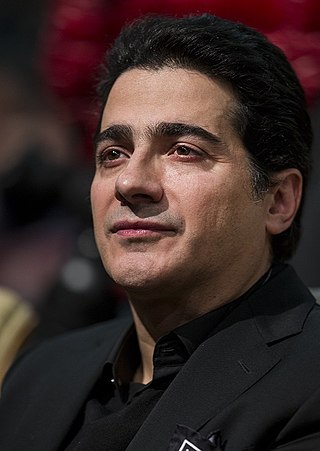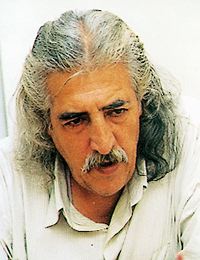
Mazandaran Province is one of the 31 provinces of Iran, located along the southern coast of the Caspian Sea and in the adjacent Central Alborz mountain range, in central-northern part of the country. The province covers an area of 23,842 km2. It was founded in 1937.

Mohammad-Reza Shajarian was an Iranian singer and master (Ostad) of Persian traditional music. He was also known for his skills in Persian calligraphy and humanitarian activities. Shajarian started his singing career in 1959 at Radio Khorasan, rising to prominence in the 1960s with his distinct singing style. His main teachers were Ahmad Ebadi, Esmaeil Mehrtash, Abdollah Davami, and Nour-Ali Boroumand. He also learned the vocal styles of singers from previous generations, including Reza Gholi Mirza Zelli, Fariborz Manouchehri, Ghamar Molouk Vaziri, Eghbal Azar, and Taj Isfahani. He has cited legendary Persian tar soloist Jalil Shahnaz as highly influential to his development, indicating that he has often tried to mimic Shahnaz's playing style in his singing.
The music of Iran encompasses music that is produced by Iranian artists. In addition to the traditional folk and classical genres, it also includes pop and internationally celebrated styles such as jazz, rock, and hip hop.

Mohammad-Taqi Bahar, widely known as Malek osh-Sho'arā and Malek osh-Sho'arā Bahār, was a renowned Iranian poet, scholar, politician, journalist, historian and Professor of Literature. Although he was a 20th-century poet, his poems are fairly traditional and strongly nationalistic in character. Bahar was father of prominent Iranist, linguist, mythologist and Persian historian Mehrdad Bahar.

Amir Hushang Ebtehaj, also known by his pen name H. E. Sayeh, was an Iranian poet of the 20th century, whose life and work spans many of Iran's political, cultural and literary upheavals.

Homayoun Shajarian is an Iranian singer. He is the son of Mohammad-Reza Shajarian.

Mazandarani (مازندرانی), or Tabari (طبری), is an Iranian language of the Northwestern branch spoken by the Mazandarani people. As of 2019, there were 2 million native speakers. As a member of the Northwestern branch, etymologically speaking, it is rather closely related to Gilaki and also related to Persian, which belongs to the Southwestern branch. Though the Persian language has influenced Mazandarani to a great extent, Mazandarani still survives as an independent language with a northwestern Iranian origin.

Sari, also known as Shahr-e-Tajan and Shari-e-Tajan, is the provincial capital of Mazandaran Province and former capital of Iran, located in the north of Iran, between the northern slopes of the Alborz Mountains and southern coast of the Caspian Sea. Sari is the largest and most populous city of Mazandaran.

Hormoz Farhat was a Persian-American composer and ethnomusicologist who spent much of his career in Dublin, Ireland. An emeritus professor of music, he was a fellow of Trinity College, Dublin. Described by the Irish Times as a "a gifted and distinctive composer of contemporary classical music," his compositions include orchestral, concertante, piano and choral music, as well string quartets and chamber works. He also wrote numerous film scores, including that of Dariush Mehrjui's 1969 film The Cow. However, his musicological research dominates his legacy; his writings on the music of Iran—a country which he insisted be called 'Persia'—were pivotal in ethnomusicology, particularly his acclaimed 1990 study The Dastgah Concept in Persian Music.

Ali Reza Eftekhari is an Iranian vocalist of Iranian classical and popular music. He is one of the most popular singers in Iran and his works are among the best-selling works of Iranian music. This singer has released more than seventy music albums so far. He is known as the man of a thousand faces of Iranian music.
Iranian folk music refers to the folk music transmitted through generations among the people of Iran, often consisting of tunes that exist in numerous variants.

Mohammad-Reza Lotfi was an Iranian classical musician renowned for his mastery of the tar and setar. He collaborated with singers such as Mohammad-Rezā Shajarian, Hengameh Akhavan, Shahram Nazeri and Alireza Shahmohammadi.
Dibaj is a city in the Central District of Damghan County, Semnan Province, Iran. At the 2006 census, its population was 2,504, in 680 families.

Hossein Monzavi was a prominent Iranian poet, essayist and translator who had great effects on Iranian literary mutating. Monzavi's reputation is in composing poems and his lyric poems are primarily in Persian, but he also has contributed to the Azerbaijani language.

Ali (Alexander) Rahbari is an Iranian composer and conductor, who has worked with more than 120 European orchestras, including the Berlin Philharmonic and the Mariinsky Opera.
Faiz Mohammad dagarzahi Balochi: فیز محمد دَگارزَهي), also known as Pailin,was a Balochi folk musician and folk singer.

Seyyed Mohammad Motamedi is an Iranian traditional vocalist, and a ney player.

Mansour Hedayati was an Iranian poet, author, social critic from Mazandaran Province. He mostly wrote naturalistic, social and critical poems in Persian and Mazandarani Language. Some of his poems have been published in some native journals and magazines.
The Jahanbeglu is a Kurdish tribe in Mazandaran Province, Iran. They were amongst several Kurdish tribes that were transplanted from northwestern Iran to Mazandaran in the late 18th century by then ruler of Iran, Agha Mohammad Khan Qajar, in order to protect the province from Turkmen raids.

Shahin Farhat is an Iranian musician, composer and music teacher. As one of the most famous composers of classical music in Iran, he has created numerous works based on common forms in Western music, such as: symphony, concerto, suite, cantata, prelude, fugue, symphonic poem, rhapsody and other traditional methods, which often add space. Romantic music is near and at the same time it has not been without the influence of Iranian music. About twenty symphonies of his works have been recorded and published so far, which is the most numerous among the works of Iranian composers, which is why he is referred to as the "Father of the Iranian Symphony".














